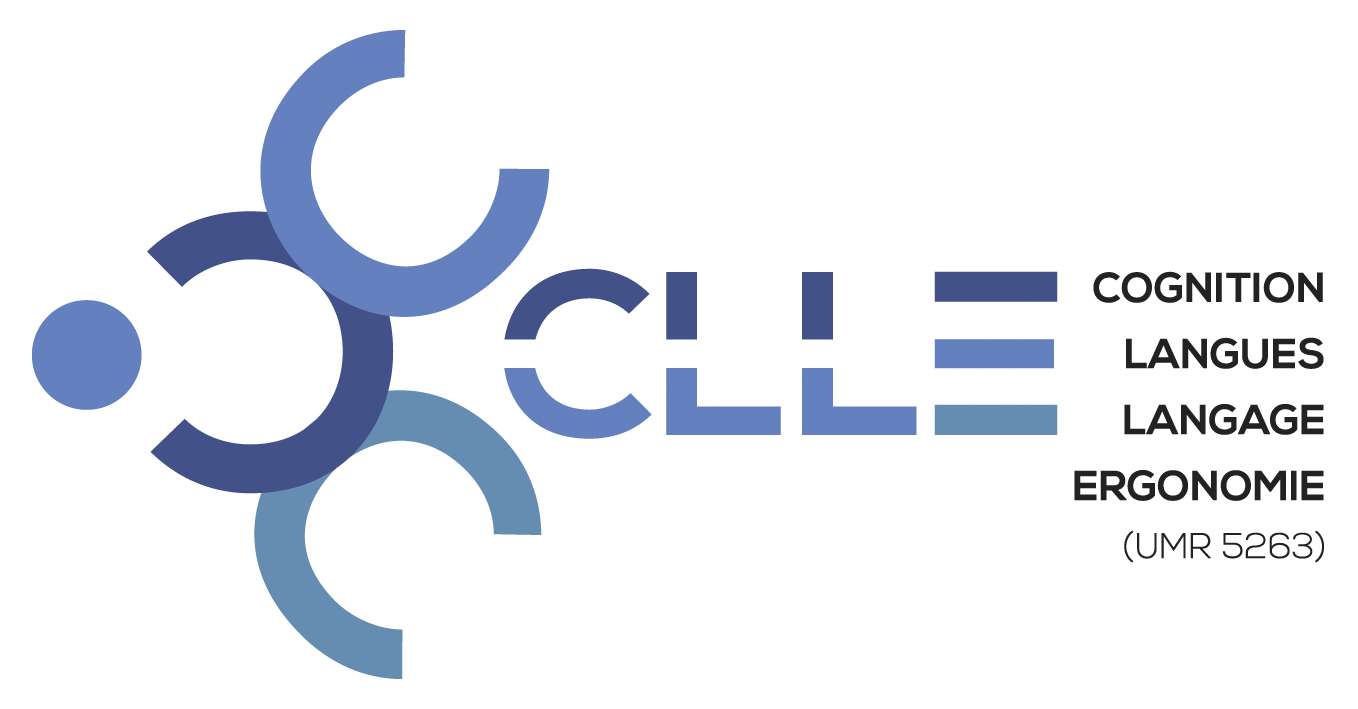-
Partager cette page
Maître de Conférences
Elodie LABEYE
Maître de ConférencesCoordonnées
- Adresse
- Bureau : B 501 CLLE - Université Toulouse 2 Jean Jaurès - 5, Allées A. Machado 31058 Toulouse Cedex
- Tél
- 05 61 50 36 03
- elodie.labeye@univ-tlse2.fr
Discipline(s) enseignée(s)
Psychologie Cognitive et Ergonomie
Cognition incarnée
Démarche expérimentale
Epistémologie
Thèmes de recherche
Processus cognitifs impliqués dans la mémorisation et l'apprentissage au regard du paradigme de la cognition incarnée :
Impact de l'imagerie mentale
Impact de la motricité et des interactions sensorielles sur les apprentissages
Apprentissage des concepts abstraits, apprentissage des langues
Nature incarnée et située des concepts concrets et abstraits
Hybridation des activités pédagogiques favorisant les processus cognitifs d'apprentissage (via MOODLE) :
Testing effect, effets d'espacement, acceptabilité ...
Ergonomie :
Interactions homme-machine dans les transports (véhicules électriques, autonomes)
Acceptabilité innovations technologiques
Actuellement:
Financement de la région pour un projet d'hybridation des Apprentissages via MOODLE pour des étudiants de Licence (17 000 euros)
Activités / CV
Directrice adjointe du département de Psychologie Cognitive et Ergonomie, UFR Psychologie, 2024-....
Co correspondante du Service d'Enseignement à Distance de l'UFR de Psychologie, 2024-....
Co responsable des UE (1000 étudiants) de Licence Epistémologie L1 et Psychologie cognitive L2, 2021-....
3 co-encadrements de thèse (avec Nathalie Huet, PR, CLLE) :
Quentin Marre 2019-2023 (ATER)
Dimitri Paisios 2020-2024 (CDU)
Lockman Aalioui 2022-en cours (CIFRE avec l’Agence nationale pour la formation professionnelle des adultes AFPA)
1 co-supervision postdoctorale (avec Loïc Caroux, mcf CLLE, et Céline Lemercier, Prof. CLLE) :
Aïsha Sahai, 2020- 2022 sur le projet C2C (financement Région de 175 k€ pour le partenaire CLLE)
Publications extraites de HAL affiliées à Cognition, Langues, Langage, Ergonomie
Informations complémentaires
- Marre, Q., Huet, N., & Labeye, E. (accepté). Imagining abstractness: the role of embodied simulations and language in memory for abstract concepts, Visual Cognition. DOI 10.1080/13506285.2024.2375202
- Marre, Q., Huet, N., & Labeye, E. (2024). Does context matter for memory? Testing the effectiveness of learning by imagining situated interactions with objects. Memory, 32(4), 502-514.
- Paisios, D., Huet, N., & Labeye, E. (2023). Addressing the elephant in the middle: Implications of the midscale disagreement problem through the lens of Body-Object Interaction ratings. Collabra: Psychology, 9(1).
- Sahaï, A., Labeye, E., Caroux, L., & Lemercier, C. (2022). Crossing the street in front of an autonomous vehicle: An investigation of eye contact between drivengers and vulnerable road users. Frontiers in psychology, 13.
- Marre, Q., Huet, N., & Labeye, E. (2021). Embodied mental imagery improves memory. Quarterly Journal of Experimental Psychology, 74(8), 1396-1405.
- Labeye, E., Hugot, M., Brusque, C., & Regan, M. (2016). The Electric Vehicle, a New Driving Experience involving specific Skills and Rules. Transportation Part F, 37, 27-40.
- Michael G.A., Mizzi R., Couffe C., Gálvez-García G., Labeye E. (2016). Spotting from the rightmost deep: A temporal field advantage in a behavioural task of attention and filtering. AIMS Neuroscience, 3, 56-66.
- Labeye, E., Adrian, J., Hugot, M., Regan, M. & Brusque, C. (2013). Daily use of an electric vehicle : Behavioural changes and potential for ITS support. Intelligent Transport Systems, 7(2), 210-214.
- Labeye, E., Oker, A., Badard, G., & Versace, R. (2008). Activation and integration of motor components in a short-term priming paradigm. Acta Psychologica, 129(1), 108-111.
- Versace, R., Labeye, E., Badard, G., & Rose, M. (2009). The contents of long-term memory and the emergence of knowledge. The European Journal of Cognitive Psychology, 21(4), 522-560.
- Brunel, L., Labeye, E., Lesourd, M. & Versace, R. (2009). The sensory nature of episodic memory : Sensory priming effects due to memory traces activation. Journal of Experimental Psychology : Learning, Memory, and Cognition, 35(4), 1081-1088.
- Brunel, L., Lesourd, M., Labeye, E., & Versace, R. (2010). The sensory nature of knowledge : Sensory priming effects in semantic categorization. Quarterly Journal of Experimental Psychology, 63(5), 955-964.
- Versace, R., Vallet, G. T., Riou, B., Lesourd, M., Labeye, E., & Brunel, L. (2014). ACT-IN: An integrated view of memory mechanisms. Journal of Cognitive Psychology,26(3),280-306.
- Labeye, E., Brusque, C., & Regan, M. (2014). Driver Acceptance of Electric Vehicles: Findings from the French MINI E Study. In A. Stevens, T. Horberry, & M. Regan (Eds.). Driver Acceptance of New Technology: Theory, Measurement and Optimisation. (Chapter 11) Surrey, England: Ashgate. (pp 153-168).
- Labeye, E., Hugot, M., Adrian, J., Regan, M., & Brusque, C. (2012, June 14-15). E mobility: A new urban mobility. In proceedings of Human Centred Design for Intelligent Transport Systems, Valencia, Spain.
- Labeye, E., Hugot, M., Regan, M., & Brusque, C. (2012). Electric Vehicles: An eco-friendly mode of transport which induce changes in driving behaviour. In D. de Waard, N. Merat, A.H. Jamson, Y. Barnard, and O.M.J.Carsten (Eds.) Human Factors of Systems and Technology. Maastricht, the Netherlands: Shaker Publishing (pp. 171-180).
- Labeye, E., Regan, M., Hugot, M., & Brusque, C. (2011). Le double enjeu de la voiture électrique : acceptabilité et sécurité. Actes du 4ème colloque ARPEnv : L’individu et la société face à l’incertitude environnementale, Ifsttar, Bron, 8-10 juin.





